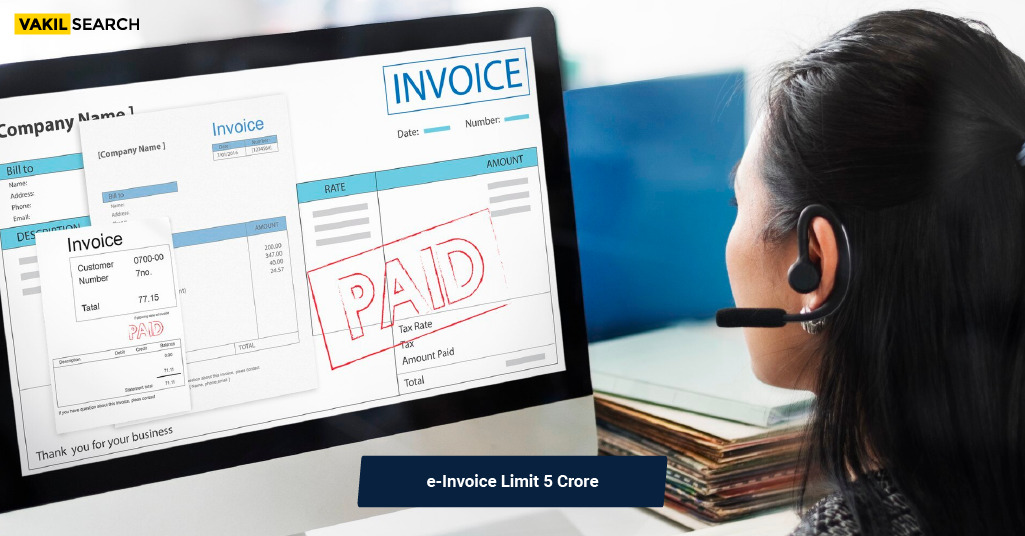Embrace the change in India's tax landscape with the new e-invoice limit set at Rs. 5 Crore, from August 2023 onwards. Ensure seamless compliance with the help of this comprehensive guide.
The e-Invoice Limit of 5 Crore, introduced via Notification No. 10/2023–Central Tax and effective from August 1st, 2023, is a pivotal development shaping the landscape for businesses with an annual turnover exceeding Rs.5 crore under the Goods and Services Tax (GST) law.
Developments:10th May 2023:The Central Board of Indirect Taxes and Customs (CBIC) has officially announced the commencement of the 6th phase of e-invoice. Consequently, businesses with a turnover exceeding Rs.5 Crore in any financial year from 2017-18 are mandated to initiate e-invoice starting from 1st August 2023. 6th May 2023:In a recent update, the Goods and Services Tax (GST) department has decided to extend the reporting window for old e-invoices on the e-invoice GST online registration Portal (IRP) by three months. Moreover, the department is yet to unveil the new implementation date for this extension. 13th April 2023:Based on advisories from the GST Network on 12th and 13th April 2023, businesses with an annual turnover equal to or exceeding Rs.100 crore must adhere to a revised timeline. They are now required to report tax invoices and credit-debit notes to the IRP within 7 days of the invoice date, effective from 1st May 2023. Businesses covered in the sixth phase of e-invoicing:Starting from 1st August 2023, e-invoice becomes mandatory for businesses with an annual aggregate turnover surpassing Rs.5 crore in any previous financial year from 2017-18. Phases Recap:
These updates mark critical milestones in the phased implementation of e-invoice, reflecting the government’s commitment to streamline and enhance tax compliance. |
In the sixth phase of e-invoice, a dynamic shift unfolds for businesses, specifically those with an annual aggregate turnover surpassing Rs.5 crore. The implementation, stipulated by Notification No. 10/2023, signifies a noteworthy progression in electronic invoicing regulations, making it mandatory for eligible businesses from August 1st, 2023.
Sixth phase of e-invoicing
The e-invoice landscape undergoes a paradigm shift with the advent of the sixth phase. This phase, mandated by the GST law, encompasses businesses with an annual turnover exceeding Rs.5 crore. The initiation of this phase, heralded on May 10, 2023, necessitates that taxpayers in this category commence issuing e-invoices from August 1, 2023. This follows a series of preceding phases targeting varying turnover brackets, commencing with businesses boasting over Rs.500 crore turnover in October 2020, culminating in the current threshold of Rs.5 crore.
Calculate GST with ease using our GST calculator India. Perfect for all your tax calculations.e-Invoicing objective and importance
The primary aim of recalibrating the turnover threshold for e-invoice is a strategic move to combat GST evasion and fraudulent activities, particularly focusing on Micro, Small, and Medium Enterprises (MSMEs). This initiative, impacting approximately 4 lakh businesses, is designed to fortify GST compliance mechanisms and curtail revenue leakages. By requiring enterprises along the supply chain to avail themselves of genuine and verified Input Tax Credit (ITC), the government seeks to ensure a comprehensive control over GST revenue leakages.
Impact of e-invoice on business and processes
Implemented businesses experience a transformative phase in their operational processes, particularly in GSTR-1 preparation and adaptations to their billing systems. While the e-invoice framework streamlines GSTR-1 filing through auto-population, it introduces intricate layers of reconciliation complexities. This initiative, however, facilitates small businesses’ access to formal credit channels, providing leverage through validated and authenticated invoices.
Is e-invoicing mandatory?
Effective from August 1, 2023, e-invoicing becomes a compulsory factor for businesses surpassing the Rs.5 crore turnover threshold. This strategic move aligns with the government’s overarching agenda to digitize transactions and fortify GST compliance standards. The ambit of e-invoicing encompasses a spectrum of documents and transactions, including tax invoices, debit notes, credit notes, and invoice-cum-bill of supply.
How can Vakilsearch assist you with the Implementation of e-invoicing?
Vakilsearch extends comprehensive support to businesses navigating the intricate terrain of e-invoice compliance. Our cloud-based SaaS solution, e-Invoicing, emerges as a all-rounder for enterprises, enabling them to seamlessly generate e-way bills and e-invoices in bulk.
With intelligent features, real-time updates, and around-the-clock support, the solution ensures a seamless transition for businesses adapting to the e-invoice limit mandate. Vakilsearch’s commitment to promoting efficiency and accuracy in compliance is underscored by the diverse functionalities embedded within the Clear e-Invoicing solution.

